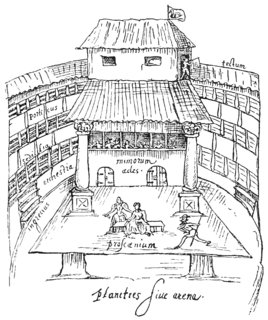Related Research Articles

English Renaissance theatre, also known as Renaissance English theatre and Elizabethan theatre, refers to the theatre of England between 1558 and 1642.

Sir William Davenant, also spelled D'Avenant, was an English poet and playwright. Along with Thomas Killigrew, Davenant was one of the rare figures in English Renaissance theatre whose career spanned both the Caroline and Restoration eras and who was active both before and after the English Civil War and during the Interregnum.
This article contains information about the literary events and publications of 1638.

Sir John Suckling was an English poet, prominent among those renowned for careless gaiety and wit – the accomplishments of a Cavalier poet. He also invented the card game cribbage. He is best known for his poem "Ballade upon a Wedding".

Richard Brome ; was an English dramatist of the Caroline era.
Rollo Duke of Normandy, also known as The Bloody Brother, is a play written in collaboration by John Fletcher, Philip Massinger, Ben Jonson and George Chapman. The title character is the historical Viking duke of Normandy, Rollo. Scholars have disputed almost everything about the play; but it was probably written sometime in the 1612–24 era and later revised, perhaps in 1630 or after. In addition to the four writers cited above, the names of Nathan Field and Robert Daborne have been connected with the play by individual scholars.
Shackerley Marmion, also Shakerley, Shakerly, Schackerley, Marmyon, Marmyun, or Mermion, was an early 17th-century dramatist, often classed among the Sons of Ben, the followers of Ben Jonson who continued his style of comedy. He was also a friend and perhaps a protégé of Thomas Heywood.
William Beeston was an English actor and theatre manager, the son and successor to the more famous Christopher Beeston.
Beeston's Boys was the popular and colloquial name of The King and Queen's Young Company, a troupe of boy actors of the Caroline period, active mainly in the years 1637–1642.
The Court Beggar is a Caroline era stage play written by Richard Brome. It was first performed by the acting company known as Beeston's Boys at the Cockpit Theatre. It has sometimes been identified as the seditious play, performed at the Cockpit in May 1640, which the Master of the Revels moved to have suppressed. However, the play's most recent editor, Marion O'Connor, dates it to "no earlier than the end of November 1640, and perhaps in the first months of 1641".
The Sisters is a Caroline stage play, a comedy written by James Shirley. It was the last of Shirley's plays performed in London prior to the closing of the theatres in September 1642, at the start of the English Civil War. "Slight in substance, The Sisters is excellent in matter of technique, and especially in...structural unity...."
The Careless Shepherdess is a Jacobean era stage play, a pastoral tragicomedy generally attributed to Thomas Goffe. Its 1656 publication is noteworthy for the introduction of the first general catalogue of the dramas of English Renaissance theatre ever attempted.
The Beaumont and Fletcher folios are two large folio collections of the stage plays of John Fletcher and his collaborators. The first was issued in 1647, and the second in 1679. The two collections were important in preserving many works of English Renaissance drama.
Aglaura is a late Caroline era stage play, written by Sir John Suckling. Several aspects of the play have led critics to treat it as a key development and a marker of the final decadent phase of English Renaissance drama.
The Antipodes is a Caroline era stage play, a comedy written by Richard Brome c. 1640. Many critics have ranked The Antipodes as "his best play...Brome's masterpiece," and one of the best Caroline comedies – "gay, imaginative, and spirited...;" "the most sophisticated and ingenious of Brome's satires." Brome's play is "a funhouse mirror" in which the audience members could "view the nature of their society."
A Jovial Crew, or the Merry Beggars is a Caroline era stage play, a comedy written by Richard Brome. First staged in 1641 or 1642 and first published in 1652, it is generally ranked as one of Brome's best plays, and one of the best comedies of the Caroline period; in one critic's view, Brome's The Antipodes and A Jovial Crew "outrank all but the best of Jonson."
Thomas Walkley was a London publisher and bookseller in the early and middle seventeenth century. He is noted for publishing a range of significant texts in English Renaissance drama, "and much other interesting literature."
The Wild Gallant is a Restoration comedy written by John Dryden. It was Dryden's earliest play, and written in prose, except for the prologue, and the epilogue, which are in verse. It was premiered on the stage by the King's Company at their Vere Street theatre, formerly Gibbon's Tennis Court, on February 5, 1663. As Dryden himself stated in his Preface, it was "the first attempt I made in Dramatique Poetry."
The Lovesick Court, or the Ambitious Politique is a Caroline-era stage play, a tragicomedy written by Richard Brome, and first published in 1659.
Edward Knight was the prompter of the King's Men, the acting company that performed the plays of William Shakespeare, Ben Jonson, John Fletcher, and other playwrights of Jacobean and Caroline drama.
References
- Gurr, Andrew. The Shakespeare Company, 1594–1642. Cambridge, Cambridge University Press, 2004.
- Sanders, Julie. "Beggars' Commonwealths and the Pre-Civil War Stage: Suckling's The Goblins, Brome's A Jovial Crew, and Shirley's The Sisters." Modern Language Review, Vol. 97 No. 1 (January 2002), pp. 1–14.
- . Dictionary of National Biography . London: Smith, Elder & Co. 1885–1900.
- Wallerstein, Ruth. "Suckling's Imitation of Shakespeare: A Caroline View of His Art." Review of English Studies 19 (1943), pp. 290–5.